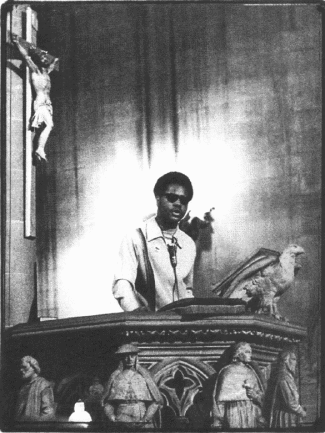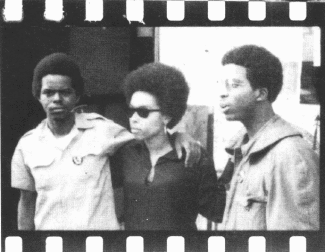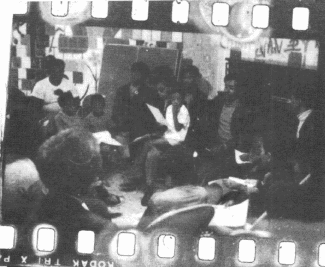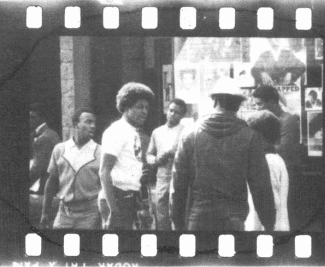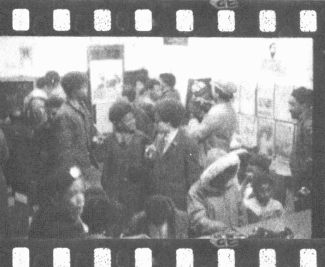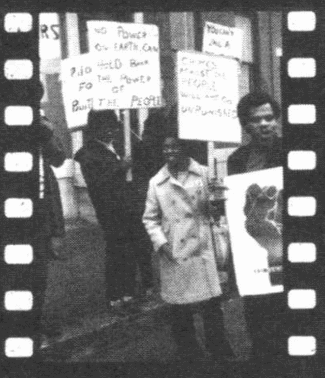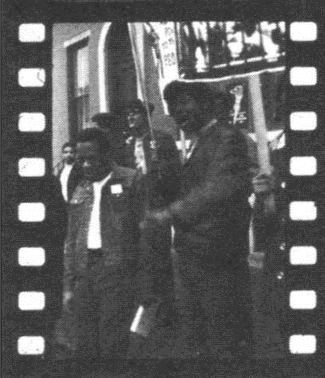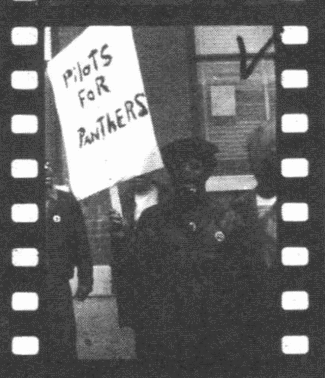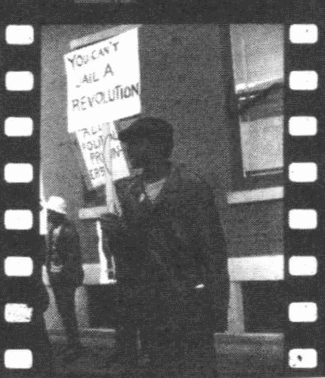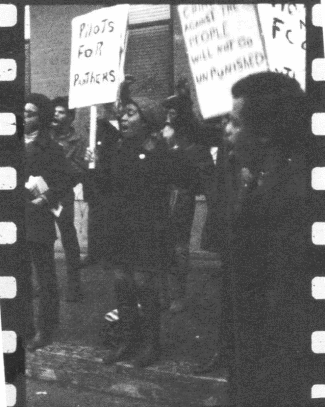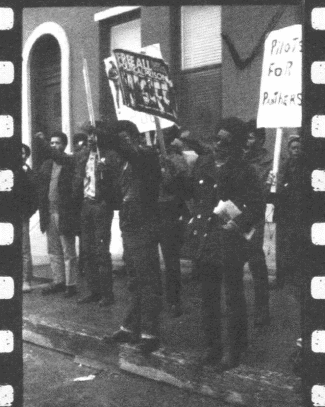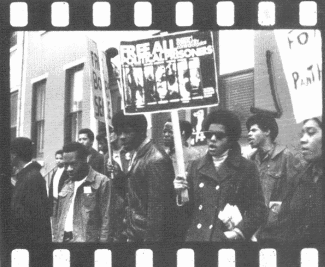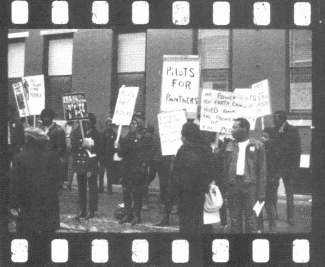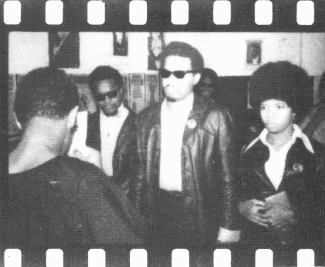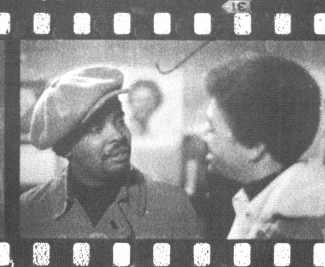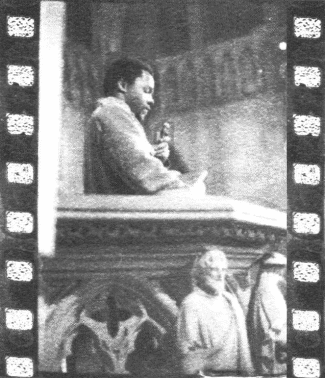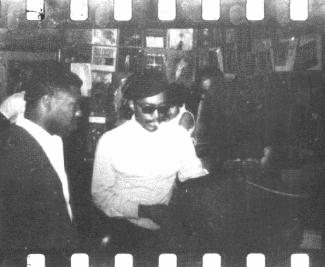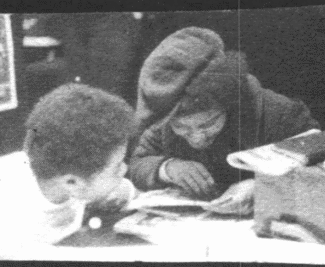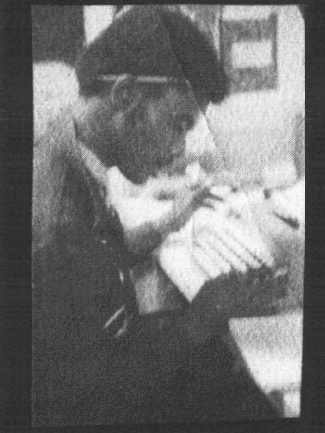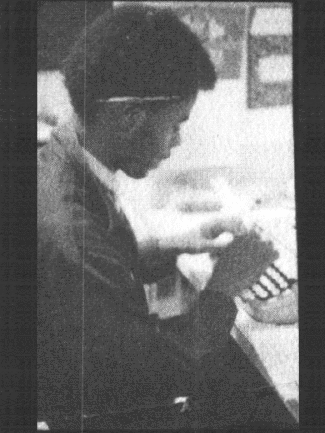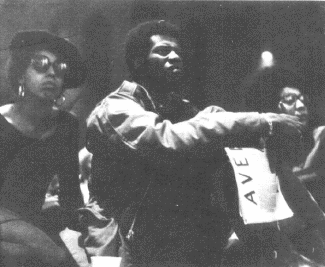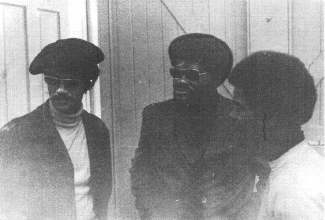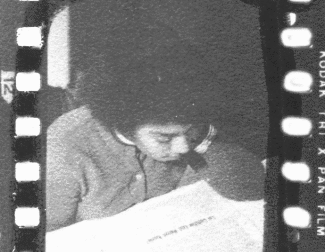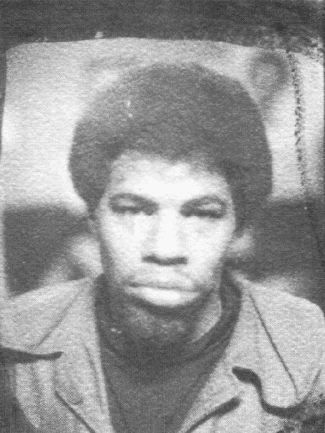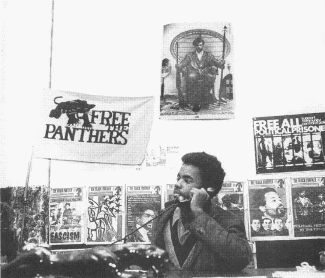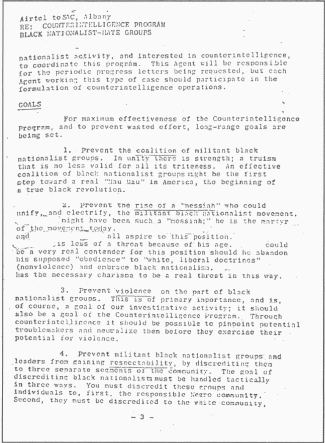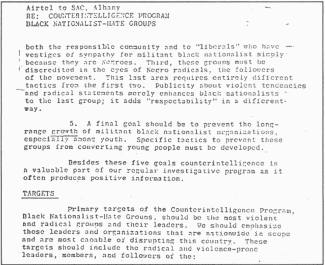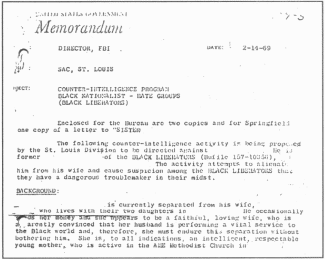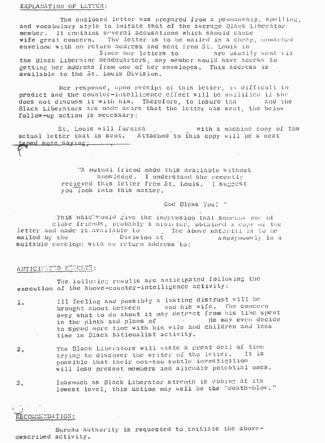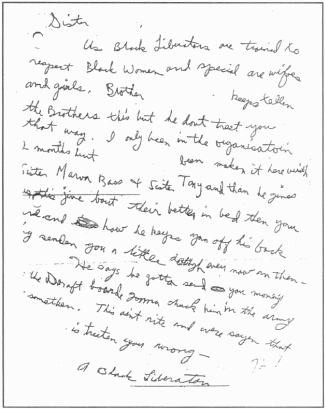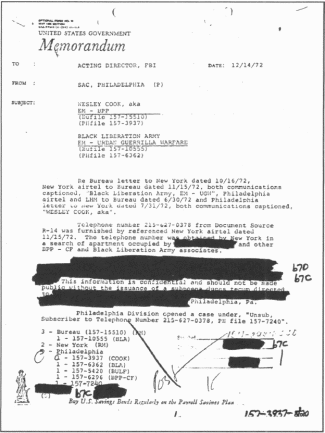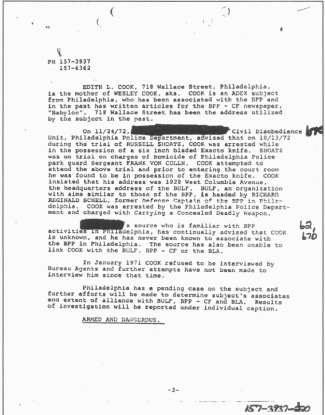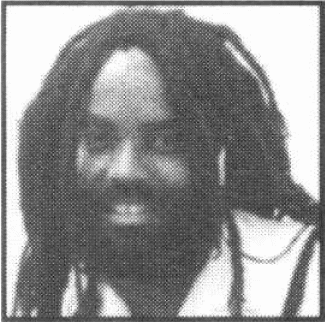Re: We Want Freedom: A Life in the Black Panther Party, by M

Posted:
Thu Jun 12, 2014 7:35 amby admin
ENDNOTES
CHAPTER ONE1. Seale, Seize the Time, 13-14.
2. Seale, Seize the Time, 14.
3. Seale, Seize the Time, 25.
4. Fanon, Wretched of the Earth, 96.
5. Newton, Revolutionary Suicide, 113.
6. Newton, Revolutionary Suicide, 71.
7. Newton, Revolutionary Suicide, 71.
8. Newton, Revolutionary Suicide, 113.
9. Seale, Seize the Time, 4; Marine, The Black Panthers, 12; Hilliard, This Side of Glory, 26.
10. Hilliard, This Side of Glory, 20.
11. Segal, The Black Diaspora, 142.
12. Moses, Classic Black Nationalism, 114.
13. Foner, E., Reconstruction, 285.
14. Foner, E., Reconstruction, 285.
15. Moses, Classic Black Nationalism, 9.
16. Jefferson, Notes on the State of Virginia (1781-32). Quoted in Moses, Classic Black Nationalism, 46.
17. Moses, Classic Black Nationalism, 210 (emphasis added).
18. Moses, Classic Black Nationalism, 212.
19. Moses, Classic Black Nationalism, 209.
20. Foner, E., Reconstruction, 45.
21. Foner, E., Reconstruction, 598-99.
22. A briefly attempted appellation of the post-Nation of Islam formation, the World Community of Islam in the West, led by the son of Elijah Muhammad, known as Warith Deen Muhammad.
23. Equiano, Life of Olaudah Equiano, 31.
24. Katz, Breaking the Chains, 11-12.
25. Linebaugh and Rediker, Many-Headed Hydra, 194.
26. Aptheker, American Negro Slave Revolts, 180-92. Quoted in Linebaugh and Rediker, Many-Headed Hydra, 194.
27. Frass, Matthew: "The First Rhode Island Regiment,"
http://www.nps.gov/colo/ Ythanout/firstri.html; Wiencek, Imperfect God, as discussed on Booknotes, CSPAN 11 November 2003.
28. Lee, Butch. Jailbreak Out of History, 21-22.
29. Kelley and Lewis, To Make Our World Anew,120.
30. Wright, Creeks and Seminoles, 86-87.
31. The term buckra was common in Black speech in the US South and in Jamaica to denote whites. Although its derivation is unclear, some suggest it arose during slavery days to reflect how brutal treatments, and whippings made one's "back raw." Harriet Tubman is quoted in McPherson's The Negro's Civil War as using the term to describe the Southern secessionists during the Civil War: "Den I heard 'twas the Yankee ship [the Wabasbh] firin, out de big eggs, and dey had come to set us free. Den I praised the Lord. He come an, put he little finger in de work, an, dey Sesh Buckra all go ... " (58-59).
32. Fresia, Toward an American Revolution, 25.
33. Aptheker, American Negro Slave Revolts, 22.
34. Aptheker, American Negro Slave Revolts, 213.
35. Judges 15:14-15, 20 (AV).
36. Wilmore, Black Religion and Black Radicalism,77-78.
37. Segal, The Black Diaspora, 144.
38. Aptheker, American Negro Slave Revolts, 222. Quoted in Segal, The Black Diaspora, 144.
39. McReynolds, The Seminoles, 75 (emphasis added).
40. McReynolds, The Seminoles, 75.
41. Aptheker, American Negro Slave Revolts, 259.
42. Kelley and Lewis, To Make Our World Anew, 197.
43. McReynolds, The Seminoles, 89.
44. McReynolds, The Seminoles, 40.
45. Wright, Creeks and Seminoles, 5-6.
46. Wright, Creeks and Seminoles, 218.
47. DuBois, John Brown, 131.
48. DuBois, John Browm, 131.
49. Anderson, Voice from Harper's Ferry, 98.
50. Anderson, Voice from Harper's Ferry, 98-99.
51. Faulkner, Requiem for a Nun (Act 1, Scene 3).
52. Matthews, Honoring the Ancestors, vii-viii (emphasis added).
53. Matthews, Honoring the Ancestors, viii.
CHAPTER TWO1. Forbes, E., We have No Country, 121.
2. Cone, Martin and Malcolm, 222.
3. Cone, Martin and Malcolm, 223.
4. Newton, Revolutionary Suicide, 48.
5. I have used the term mass violence rather than the elite's preferred, and more projected, term, riot, because this term is usually given a somewhat pejorative connotation, attempting to mask the political objections and objectives of the agents involved in such acts.
6. Feagin, Racist America, 63.
7. http:/ /www.pbs.org/wnet/aaworld/ reference/articles/ red_summer.html
8. Forbes, E., We Have No Country, 9.
9. Forbes, E., We Have No Country,134.
10. Forbes, E., We Have No Country, 304.
11. Forbes, E., We Have No Country, 305.
12. Forbes, E., We Have No Country, 51-52.
13. Forbes, E., We Have No Country, 142.
14. Moses, Classical Black Nationalism, 108-9.
15. Forbes, E., We Have No Country, 114-15.
16. Forbes, E., We Have No Country, 51-52.
17. Forbes, E., We Have No Country,150 (emphasis added).
18. Quoted in Forbes, E., We Have No Country, 114.
19. Forbes, E., We Have No Country, 114.
20. Zinn, People's History, 449.
21. Zinn, People's History, 450.
22. Zinn, People's History, 451.
23. Seale, Seize the Times, 80.
24. Seale, Seize the Times, 139.
25. Seale, Seize the Times, 139.
26. Seale, Seize the Times, 136.
27. Seale, Seize the Times, 139.
28. Smith, William Gardner, Return to Black America, 173. Quoted in Singh, "'Undeveloped Country' of the Left," 63.
29. Newton, To Die For the People, 8.
30. This passage was written from memory. Years later it was learned that Frankhouser was, in fact, an informant for the ATF (Alcohol, Tobacco & Firearms Division of the Treasury Department) and, as such, had snitched on the Klan, the Minutemen, and various other right-wing groups with which he was affiliated (Donner, Age of Surveillance, 346).
CHAPTER THREE1. McPherson, The Negro's Civil War, 259.
2. Zinn, People's History, 248.
3. Zinn, People's History, 49-50.
4. Zinn, People's History, 213.
5. Forbes, E., We Have No Country, 191.
6. Abdy, Edward. Journal of Residence and Tour in the United States. Quoted in Forbes, E., But We Have No Country, 191.
7. Ignatiev, How the Irish, 124.
8. Ignatiev, How the Irish, 125-26.
9. Ignatiev, How the Irish, 155.
10. Ignatiev, How the Irish, 134.
11. Ignatiev, How the Irish, 134.
12. Ignatiev, How the Irish, 144.
13. Forbes, E., We Have No Country, 150-51.
14. Irons, People's History of the Supreme Court, 152 (emphasis added).
15. Prigg v. PA, 41 US 536, 625-26 (1842).
16. Newton, Revolutionary Suicide, 90-91.
17. The Black Panther, April 6, 1970, 17.
CHAPTER FOUR1. Newton, Revolutionary Suicide, 110.
2. Cleaver, Soul On Ice, 27.
3. Hilliard, Huey Newton Reader, 51-52.
4. Newton, Revolutionary Suicide 120-21.
5. Seale, A Lonely Rage, 153, 154.
6. Seale, A Lonely Rage, 154.
7. Hilliard, Huey Newton Reader, 67.
8. Neal, "Church and Survival Programs," 11.
9. Newton, To Die For the People, 89.
10. Newton, To Die For the People, 89.
11. Abron, "Serving the People," 184.
12. Washington, Other Sheep, 128.
13. Washington, Other Sheep, 134.
14. Latino/Latina. The @ sign is used in multi-gender circumstances to represent the o and a endings.
15. Freed, Agony in New Haven, 113-14.
16. Newton, Revolutionary Suicide, 296.
17. Cluster, Should Have Served, 61.
18. Singh, "Black Panther Party," 32.
19. Singh, "Black Panther Party," 84-85.
20. Fresia, Toward an American Revolution, 28.
21. Fresia, Toward an American Revolution, 50.
22. "The People and the People Alone Were the Motive Power in the Making of the History of the People's Revolutionary Constitutional Convention Plenery Session!" The Black Panther, September 12, 1970, 3.
23. Newton, To Die For the People, 90-91.
24. Newton, To Die For the People, 31.
25. Newton, To Die For the People, 31 (emphasis added).
26. Hilliard, Huey Newton Reader, 253.
27. Fredrickson, White Supremacy, xi.
28. Fredrickson, White Supremacy, 4-5.
29. Hilliard, Huey Newton Reader, 206.
30. Hilliard, Huey Newton Reader, 260-61.
31. Hilliard, Huey Newton Reader, 259.
32. Hilliard, Huey Newton Reader, 259.
33. This passage written from memory.
CHAPTER FIVE1. Newton, The Black Panther, July 20, 1967, 5.
2. Brown, Taste of Power, 252. Soul Breaker was the prisoner's name for the solitary confinement cell in Alameda County Jail, California.
3. Brown, Taste of Power, 252.
4. Brown, Taste of Power, 252.
5. Brown, Taste of Power, 253.
6. Seale, Seize the Times, 59 (emphasis added).
7. Mao, Quotations, 58.
8. Hayes, "All Power to the People," 168.
9. Anthony, Picking Up the Gun, 21.
10. Hayes, "All Power to the People," 167.
11. Swearingen, FBI Secrets, 83.
12. Newton, To Die For the People, 92.
13. Singh, "Black Panther Parry," 56.
14. Eldridge Cleaver, "Letter to My Black Brother in Vietnam," The Black Panther, May 2, 1970. This long article was reprinted as a pamphlet and sent to Black veterans and soldiers fighting in Vietnam. (Cleaver, K "Back to Africa," 233.)
15. The Black Panther, November 1, 1969, 12-13.
16. The Black Panther, January 19, 1971, 10-11. That said, there were Black Panthers in Vietnam. They organized branches by themselves and wore Panther buttons on their US uniforms. They didn't care whether they were "officially" recognized by California, they just did what they thought was right.
17. The Black Panther, August 23, 1969.
18. Washington Post December 28, 1969, A-18.
19. Washington Post, February 1, 1970, A-13.
20. Cleaver, K., "Back to Africa," 214.
21. Cleaver, K., "Back to Africa," 214.
22. Zinn, People's History, 593.
23. Donner, Age of Surveillance, 178.
24. This passage was written from memory.
25. Cleaver, K., "Back to Africa," 235.
26. US. Dept. of Justice, FBI report to Attorney General, July 15, 1969:4
27. Donner, Age of Surveillance, 83.
CHAPTER SIX1. Barenblatt v. US. 360 US. 109; dissent, 150 (1959). In light of the revelation that Black was a member of the Ku Klux Klan in his younger manhood, one might wonder at the extent of his knowledge of "groups which advocate extremely unpopular social or government innovations." Despite his KKK membership, Black's nomination was opposed for being too "radical," that is, too much in favor of the causes of the poor. The Chicago Tribune would denounce Roosevelt for the nomination, calling it "the worst he could find." Irons, People's History of the Supreme Court, 326.
2. Newsweek, February, 1969.
3. US Dept. of Justice, FBI Report to Attorney General, July 15, 1969:4.
4. Hoover, House Subcom. Testimony; April 17, 1969:68-70, 99.
5. Brown, Taste of Power, 200.
6. Grady-Willis, "Black Panther Party," 372. Interestingly, another US Senate document, published in 1976, displays exhibits which feature other misspellings, at least in the proposed letter sent to FBL HQ on January 12, 1969. The document, of several pages, includes the following interesting language:
"Consequently, Chicago now recommends the following letter be sent [Blank] handwritten, on plain paper: 'Brother. ... I think you ought to know what I'd do if I was you. You might hear from me again.'" We need not be psychic to intuit the intentions of the FBI. The document itself makes these clear. "It is believed the above may intensify the degree of animosity between the two groups and occasion [Blank] to take retalitory[sic] action which could disrupt the BPP or lead to reprisals against its leadership."
The FBI, then, under the claimed objective of "preventing black militant violence," wrote to the Rangers, telling them the Panthers were trying to "hit" them, in a very bald attempt to spark "retaliatory action" against the BPP, or, at the very least, "reprisals" from disgruntled BPP members against their own leadership. (Sen. Sel. Com. Hearing, vol. 6, 433).
7. Churchill, Agents of Repression, 58.(emphasis added).
8. Zinn, People's History, 455.
9. Swearingen, FBI Secrets, 29.
10. Swearingen, FBI Secrets, 29 (emphasis added).
11. Sen. Sel. Com. Hearings, vol. 6, 9 (emphasis added).
12. Each of the following case studies appears in documents that the author has studed, either a true and correct copy of a government file, testimony before a Senate subcommittee, or a published artifact that survives from the period.
13. Churchill, Agents of Repression, 25.
14. Perkus, COINTELPRO, 161-62.
15. Perkus, COINTELPRO, 162.
16. Perkus, COINTELPRO, 163.
17. Perkus, COINTELPRO, 154.
18. Perkus, COINTELPRO, 164.
19. Perkus, COINTELPRO, 165.
20. Perkus, COINTELPRO, 165.
21. Perkus, COINTELPRO, 70.
22. Perkus, COINTELPRO, 77-78.
23. Sen. Sel. Com. Hearing, vol. 6, 617-21 (emphasis added).
24. Sen. Sel. Com. Hearing, vol. 6, 617-19.
25. Sen. Sel. Com. Hearing, vol. 6, 621.
26. The full name of the Church Committee is the Senate Select Committee to Study Governmental Operations with Respect to Intelligence Activities: Frank Church, Idaho, Chairman.
27. Sen. Sel. Com. Hearing, vol. 6, 23.
28. Sen. Sel. Com. Hearings, vol. 6, 24.
29. Sen. Sel. Com. Hearing, vol. 6, 24.
30. Sen. Sel. Com. Hearing, vol. 6, 49-50 (emphasis added).
31. Sen. Sel. Com. Hearing, vol. 6, 411-12.
32. Perkus, COINTELPRO, 28.
33. Perkus, COINTELPRO, 23.
34. Sen. Sel. Com. Hearing, vol. 6, 25.
35. Swearingen, FBI Secrets, 82-83. In Swearingen's text, the names of fellow agents are aliases, which he italicized.
36. Swearingen, FBI Secrets, 82-83.
37. Anthony, Spitting in the Wind, 37.
38. Anthony, Spitting in the Wind, 37.
39. Anthony, Spitting in the Wind, 38.
40. Anthony, Spitting in the Wind, 38 (emphasis added).
41. "8 Panthers Held in Murder Plot," New Haven Register, May 22, 1969.
42. Freed, Agony in New Haven, 25.
43. Freed, Agony in New Haven, 251-53.
44. Among the names Sams claimed was Dingiswayo, the name of the eighteenth-century Chief of the Mthethwa Confederacy in Southern Africa (where a young Shaka learned the arts of war leading to the rise of the Zulus).
45. Freed, Agony in New Haven, 255.
46. Freed, Agony in New Haven, 253.
47. Freed, Agony in New Haven, 25.
48. Tackwood, Glass House Tapes, 30.
49. Tackwood, Glass House Tapes, 30 (emphasis added).
50. Tackwood, Glass House Tapes, 46-48.
51. Tackwood, Glass House Tapes, 48.
52. Churchill, Agents of Repression, 65.
53. Churchill, Agents of Repression, 66.
54. Churchill, Agents of Repression, 66.
55. Churchill, Agents of Repression, 68.
56. Churchill, Agents of Repression, 403.
57. Churchill, Agents of Repression, 58.
58. Shakur, Assata, 222.
59. Zinn, People's History, 455.
60 The Harris Survey Yearbook of Public Opinion, 1970.
61. James, Shadow Boxing,112.
62. James, Shadow Boxing, 112.
63. This figure is provided by long-time Party member Forbes, F., "Why I Joined the Black Panther Party," 237. Forbes counts from 1966-1970.
64. Lule, Eternal Stories, 65-66. See notes 13 and 15 in Lule's text for extensive sources.
65. Reed, "Another Day at the Front," 193.
66. Churchill, COINTELPRO Papers, 215.
67. Citizen's Commission to Investigate the FBI, "Complete Collection," 8-9.
68. Churchill, Agents of Repression, 60.
69. Churchill, Agents of Repression, 60.
70. Sen. Sel. Com. Hear., vol. 6,61-2 (emphasis added).
CHAPTER SEVEN1. Eugene, "Moral Values," 317.
2. Pearson, Shadow of the Panther, 179.
3. Pearson, Shadow of the Panther, 344.
4. Henderson, "Lumpenproletariat as Vanguard," 188.
5. Jones, Black Panther Party Reconsidered, 4.
6. Jones, Black Panther Party Reconsidered, 11.
7. Cleaver, K., "Women, Power, and Revolution," 125-26.
8. Cleaver, E., "Message to Sister Erica Huggins," The Black Panther, July 5, 1969. In the article Cleaver spells Ericka's name without the k.
9. Cleaver, E., "Message to Sister Erica Huggins."
10. Foner, P., Black Panthers Speak, 6.
11. Cleaver, K., "Women, Power, and Revolution," 126.
12. Balagoon, Look For Me, 293.
13. Bukhari, "Reflections, Musings," 84.
14. Bukhari, "Reflections, Musings," 84.
15. Balagoon, Look For Me, 293.
16. Matthews, "No One Ever Asks," 289.
17. Balagoon, Look For Me, 287.
18. Balagoon, Look For Me, 292 (emphasis added).
19. Matthews, "No One Ever Asks," 291.
20. Pearson, Shadow of the Panther, 179.
21. LeBlanc-Ernest, "The Most Qualified Person," 307-78.
22. Seale, A Lonely Rage; Quoted in LeBlanc- Ernest, 'The Most Qualified Person," 309.
23. Jennings, "Why I Joined the Party," 262-63.
24. Jennings, "Why I Joined the Party," 255.
25. Jennings, "Why I Joined the Party," 260.
26. Jennings, "Why I Joined the Party," 263.
27. Brown, Taste of Power, 368-70.
28. Brown, Taste of Power, 371.
29. Bukhari, "Reflections, Musings."44-5. Bukhari's account is drawn from an unpublished manuscript of her "Reflections, Musings, and Political Opinions," ca. 1997.
30. Bukhari, "Reflections, Musings," 5, 6.
31. Bukhari, "Reflections, Musings," 6.
32. Bukhari, "Reflections, Musings," 6.
33. Bukhari, "Reflections, Musings," 7.
34. Bukhari, "Reflections, Musings," 9.
35. Bukhari, "Reflections, Musings," 36-52.
36. Bukhari, "Reflections, Musings," 37, 42.
37. Bukhari, "Reflections, Musings," 43.
38. Bukhari's original footnote text reads:
"The Black Panthers split in 1971. From that time until 1976 there existed an East Coast and West Coast Black Panther Party. For purposes of this writing, the Black Panther Party was destroyed in 1971."
39. Bukhari, "Reflections, Musings," 44, 45.
40. Bukhari, "Reflections, Musings," 47, 48.
41. Singh, "Black Panther Party," 87.
42. Barbara Easley Cox, personal communication with the author, 2003.
43. Barbara Easley Cox, personal communication with the author, 2003.
44. Cleaver, E., "Message to Sister Erica Huggins."
45. Naima Major, personal communication with the author, 2003.
46. Rosemari Mealy, from four page letter to the author, December 28, 2003.
47. This section is drawn from memory.
48. Brown, Taste of Power, 260.
49. Cleaver, E., Soul On Ice, 282; Cleaver, E., "Message to Sister Erica Huggins."
50. Cleaver, E., "Message to Sister Erica Huggins."
CHAPTER EIGHT1. Newton, Revolutionary Suicide, 51.
2. Jennings, "Why I Joined the Party," 240.
3. Forbes, F, "Point No.7," 231.
4. Forbes, F, "Point No.7," 232-33.
5. Forbes, F, "Point No.7," 233.
6. Forbes, F, "Point No.7," 224-25.
7. Forbes, F, "Point No.7," 226-27.
8. Cluster, Should Have Served That Cup, 65.
9. Washington, Other Sheep I Have, 126-27.
10. Freed, Agony in New Haven, 34-35.
11. This passage was written from memory.
CHAPTER NINE1. Thomas Paine, Common Sense, 3 (emphasis in original).
2. Hilliard, Huey Newton Reader, 346-47.
3. Grady-Willis, "The Black Panther Party," 366; Fletcher et al., Still Black, S till Strong, 18.
4. Exhibit 5 in Black Panther Parry, Pt.1: Investigation of Kansas City Chapter; National Organization Data, Hearings Before Committee on Internal Security, Mar. 4-5, 10, 1970 (Wash., DC: US Gov't Print Off., 1970), p. 2805) emphasis added.
5. Papke, Heretics in the Temple, 120.
6. Shakur, Assata, 232.
7. Kleffner, ''Interview with Geronimo."
8. Lapham, "Notebook: Power Points."
9. From FBI Memo from HQ to San Francisco field office, February 24, 1971. Quoted in Newton, War Against the Panthers, 68-69.
10. Newton, Revolutionary Suicide, 296.
11. Hilliard, Huey Newton Reader, 355.
12. Cleaver, K., "Back to Africa," 237.
13. On the Purge of Geronimo from the Black Panther Party," The Black Panther, January 23, 1971, 7.
14. Hilliard, Huey Newton Reader, 355 (emphasis added).
15. Hilliard, Huey Newton Reader, 356.
16. Hilliard, Huey Newton Reader, 356.
17. FBI Memo from HQs to Philadelphia field office; August 19, 1970. Quoted in Newton, War Against the Panthers, 58.
18. Hilliard, Huey Newton Reader, 356.
19. Shakur, Assata, 231.
20. Shakur, Assata, 231-32.
21. Hilliard, Huey Newton Reader, 358-59.
22. Brown, Taste of Power, 252.
23. Hilliard, This Side of Glory, 180.
24. Hilliard, This Side of Glory, 120-22.
25. Johnson, "Explaining the Demise," 404.
26. Johnson, "Explaining the Demise," 404.
CHAPTER TEN1. Carmichael, Black Power, 58-59.
2. Hilliard, Huey Newton Reader, 277.
3. Hilliard, Huey Newton Reader, 358.
4. Bukhari, "Reflections, Musings," 86-88 (emphasis added).
5. Hilliard, Huey Newton Reader, 222-23.
6. Hilliard, Huey Newton Reader, 169.
7. Hilliard, Huey Newton Reader, 222-23.
8. Schell, 67; I left the Black Panther Party in late 1971-early 1972 and participated in this collective-MAJ.
9. LeBlanc-Ernest, "The Most Qualified Person," 326. Njeri's son, Fred Hampton, Jr., did time as a political prisoner. An outstanding speaker like his father, "Young Chairman Fred" is known to many as a hip-hop activist and through the Dead Prez song "Behind Enemy Lines."
10. Jones, Blauk Panther Party Reconsidered, 6.
11.
http://www.adl.org/learn/Ext_US/Black_ Panther. asp;
http://www.newblackpantherparty.com12.
http://www.adl.org/learn/Ext_US/Black_ Panther. asp;
http://www.newblackpantherparty.com13. Jones, Black Panther Party Reconsidered, 6.
14. The Black Panther Collective The Black Panther International News Service, 1:5 (1998), 12.
15. Heike Kleffner, "Interview with Geronimo," Race and Class [35:1] 1993.
16. Carr, Bad, 233. Citation is to an unsigned afterword completed in 1993.
17. CRIP informant (Br. Amir) to author, December 2003.
18. Shakur, S., Monster, 304.
19. Balagoon, Look For Me, 285-86.
20. Cross, "Stages of Black Identity," 324.
21. Balagoon, Look For Me, 286.
22. Williams, J., "The Black Panthers of Oakland."
23. LeBlanc-Ernest, "The Most Qualified Person," 325-26.
24. Jones, "Don't Believe the Hype," 37.
25. Balagoon, Look For Me, 360-61.
AFTERWORD1. Roberston, Wordsworth Dictionary of Quotations, 167.
2. Frank A. Guridy, "From Solidarity to Cross-Fertilization: Afro-Cuban/ African American Interaction during the 1930s and 1940s," Radical History Review (Fall 2003), 20.
Re: We Want Freedom: A Life in the Black Panther Party, by M

Posted:
Thu Jun 12, 2014 7:36 amby admin
BIBLIOGRAPHY
Abdy, Edward. Journal of Residence and Tour in the United States of Northern America from April, 1833 to October, 1834. London: J. Murray, 1835.
Abron, JoNina M., "'Serving the People:' The Survival Programs of the Black Panther Party." In Jones, ed., Black Panther Party Reconsidered, 177-192.
Anderson, Osbourne P.A Voice From Harper's Ferry. New York: World View, 1974.
Anthony, Earl. Picking Up the Gun: A Report on the Black Panthers. New York: Dial, 1970.
---. Spitting in the Wind: The True Story Behind the Violent Legacy of the Black Panther Party. Malibu, CA: Roundtable, 1990.
Aptheker, Herbert. American Negro Slave Revolts. New York: International, 1943.
Balagoon, Kuwasi, et al. Look For Me in the Whirlwind: The Collective Autobiography of the New York 21. New York: Vintage, 1971.
Booker, Chris. "Lumpenization: A Critical Error of the Black Panther Party." In Jones, ed., Black Panther Party Reconsidered, 337-362.
Brown, Elaine. A Taste of Power: A Black Woman's Story. New York: Anchor, 1992.
Bukhari, Safiya Asya. "Reflections, Musing, and Political Opinions." Unpublished Manuscript, ca. 1997.
Carmichael, Stokely (Kwame Ture) and Charles V. Hamilton. Black Power: The Politics of Liberation in America. New York: Vintage, 1967.
Carr, James. Bad: The Autobiography of James Carr. Oakland, CA: AK Press, 2002.
Churchill, Ward and Jim Vander Wall. Agents of Repression: The FBI's Secret Wars Against the Black Panther Party and the American Indian Movement. Cambridge, MA: South End, 1990.
---. The COINFELPRO Papers: Documents from the FBI's Secret Wars Against Dissent in the United States. Cambridge, MA: South End, 1990.
Citizens' Commission to Investigate the FBI. 1972. "The Complete Collection of Political Documents Ripped-Off From the F.B.I. Office in Media, PA, March 8, 1971." WIN.
Cleaver, Eldridge. "Message to Sister Erica Huggins of the Black Panther Party," The Black Panther, July 5, 1969.
---. Soul on Ice. New York: Dell, 1970.
Cleaver, Kathleen Neal. "Back to Africa: The Evolution of the International Section of the Black Panther Party (1969-1970)." In Jones, ed., Black Panther Party Reconsidered, 211-254.
---. "Women, Power, and Revolution." In Cleaver, K., ed., Liberation, Imagination, 123-127.
Cleaver, Kathleen and George Katsiaficas, eds. Liberation, Imagination, and the Black Panther Party: A New Look at the Panthers and their Legacy. New York: Routledge, 2001.
Cluster, Dick, ed. They Should Have Served that Cup of Coffee: 7 Radicals Remember the '60s. Boston: South End, 1979.
Cone, James H. Black Theology, vol. 3. Maryknoll, NY: Orbis, 1993.
---. Martin and Malcolm and America: A Dream or a Nightmare. Maryknoll, NY: Orbis, 1991.
Cross, Jr., WE., Thos. Parham and J.E. Helms. "The Stages of Black Identity Development: Nigrescence Models." In Jones, ed., Black Psychology, 319-338.
Donner, Frank. The Age of Surveillance: The Aims and Methods of Americas Political Intelligence System. New York: Vintage, 1981.
DuBois, W.E.B. John Brown. Armonk, NY and London: M.E. Sharpe, 1997.
Equiano, Olaudah. The Life of Olaudah Eqiano, or Gustavus Vassa, the African. Mineola, NY: Dover, 1999.
Eugene, Toinette M., "Moral Values and Black Womanists." In Cone, Black Theology, 309-320.
Fanon, Frantz. The Wretched of the Earth. Translated by Constance Farrington. New York: Grove, 1966.
Feagin, Joe R. Racist America: Roots, Current Realities and Future Reparations. New York: Routledge, 2000.
Faulkner, William, Requiem for a Nun. New York: Random House, 1951.
Fletcher, Jim, Tanaquil Jones, and Sylvere Lotringer, eds. Still Black, Still Strong: Survivors of the U.S. War Against Black Revolutionaries -- Dhoruba bin Wahad, Mumia Abu-Jamal, Assata Shakur. New York: Semiotext(e), 1993.
Foner, Eric. Reconstruction: America's Unfinished Revolution: 1963-1877. New York: Harper & Row, 1988.
Foner, Phillip S., ed. The Black Panthers Speak. Philadelphia: Lippincott, 1970. Reprinted New York: Da Capo, 1995. Page references are to the 1995 edition.
Forbes, Ella. "But We Have No Country": The 1851 Christiana Pennsylvania Resistance. Cherry Hill, NJ: African Legacy Homestead, 1998.
Forbes, Flores Alexander. "Point No. 7: We Want an Immediate End to Police Brutality and the Murder of Black People: Why I joined the Black Panther Party." In Nelson, ed., Police Brutality, 225-239.
Frederickson, George M. White Supremacy: A Comparative Study in American and South African History. New York: Oxford University, 1981.
Freed, Donald. Agony in New Haven: The Trial of Bobby Seale, Ericka Huggins and the Black Panther Party. New York: Simon & Schuster, 1973.
Fresia, Jerry. Toward an American Revolution: Exposing the Constitution and Other Illusions. Boston: South End, 1988.
Grady-Willis, Winston A. "The Black Panther Party: State Repression and Political Prisoners." In Jones, ed., The Black Panther Party Reconsidered, 363-389.
Harris Survey Yearbook of Public Opinion, 1970. New York: Louis Harris and Associates, 1971.
Hayes III, Floyd W, and Francis A. Kleine III. "'All Power to the People': The Political Thought of Huey P. Newton and the Black Panther Party." In Jones, ed., The Black Panther Party Reconsidered, 158-175.
Henderson, Errol A. 1997. "The Lumpenproletariat as Vanguard? The Black Panther Party, Social Transformation, and Pearson's Analysis of Huey Newton." Journal of Black Studies 28(2): 171-199.
Hilliard, David and Lewis Cole. This Side of Glory: The Autobiography of David Hilliard and the Story of the Black Panther Party. Boston: Little, Brown, 1993.
Hilliard, David and Donald Weise, eds. The Huey P Newton Reader. New York: Seven Stories, 2002.
The Holy Bible (King James Version). Dallas, TX: International Prison Ministry, 1988.
Ignatiev, Noel. How the Irish Became White. New York: Routledge, 1995.
Irons, Peter. A People's History of the Supreme Court. New York: Viking, 1999.
James, Joy. Shadow Boxing: Representations of Black Feminist Politics. New York: St. Martin's Press, 1999.
Jayko, Margaret, ed. FBI on Trial: The Victory of the Socialist Workers Party Suit Against Government Spying. New York: Pathfinder, 1988.
Jennings, Regina. ''Why I joined the Party: An Africana Womanist Reflection." In Jones, ed., The Black Panther Party Reconsidered, 258-265.
Johnson III, Ollie A. "Explaining the Demise of the Black Panther Party: The Role of Internal Factors." In Jones, ed., The Black Panther Party Reconsidered, 391-414.
Jones, Charles E., ed. The Black Panther Party Reconsidered. Baltimore, MD: Black Classic, 1998.
Jones, Charles E. and Judean L. Jeffries. "'Don't Believe the Hype:' Debunking the Panther Mythology," In Jones, ed., The Black Panther Party Reconsidered, 25-56.
Jones, R.L., ed. Black Psychology. 3rd ed. Hampton, VA: Cobb & Henry, 1991.
The Journal of American History 64(64): June 1977-March 1978.
Katz, William L. Breaking the Chains: African-American Slave Resistance. New York: Aladdin, 1990. Page references are to the 1998 edition.
Kelley, Robin D.C. and Earl Lewis, eds. To Make Our World Anew: A History of African Americans. New York: Oxford University, 2000.
Kleffner, Heike. 1993. "Interview with Geronimo," Race and Class 35(1).
Lapham, Lewis. "Notebook: Power Points," Harper's, August, 2002.
LeBlanc-Ernest, Angela D. "'The Most Qualified Person to Handle the Job': Black Panther Party Women, 1966-1982," In Jones, ed., The Black Panther Party Reconsidered, 305-334.
Lee, Butch. Jailbreak Out of History: The Re-Biography of Harriet Tubman. Brooklyn, NY: Stoopsale Books, 2000.
Lee, Chisun. "The NYPD Wants to Watch You: Nation's Largest Law Enforcement Agency Vies for Total Spying Power," Village Voice, December 18-24, 2002, 30-36.
Linebaugh, Peter and Marcus Rediker. The Many Headed Hydra: Sailors, Slaves, Commoners, and the Hidden History of the Revolutionary Atlantic. Boston: Beacon, 2000.
Lule, Jack. Daily News, Eternal Stones: The Mythological Role in Journalism. New York: Guilford Press, 2001.
Mao Tse-Tung. Quotations from Chairman, Mao Tse-Tung. Peking, China: Foreign Language, 1972.
Marine, Gene. The Black Panthers. New York: Signet, 1969.
Matthews, Donald H. Honoring the Ancient Ancestors: An African Cultural Interpretation of Black Religion and Literature. Revised. New York: Oxford University, 1998.
Matthews, Tracye. "'No One Ever Asks What a Man's Place in Revolution Is': Gender and the Politics of the Black Panther Party, 1966-1971," In Jones, ed., The Black Panther Party Reconsidered, 267-304.
McPherson, James N. The Negro's Civil War: How Amencan Blacks Felt During the War for the Union. New York: Ballantine Books, 1965. Page references are to the 1991 edition.
McReynolds, Edwin C. The Seminoles. Norman, OK: University of Oklahoma, 1957.
Monges, Miriam Ma'at-Ka-Re. "'I Got a Right to the Tree of Life:' Reflections of a Former Community Worker," In Jones, ed., The Black Panther Party Revisited,135-145.
Moses, Wilson Jeremiah, ed. Classical Black Nationalism: From the American Revolution to Marcus Garvey. New York: New York University Press, 1996.
Neal, Father Earl A. "The Role of the Church and the Survival Program." The Black Panther, May 15, 1971, 11.
Nelson, Jill. Police Brutality: An Anthology. New York: WW Norton, 2000.
Newton, Huey P. To Die For the People: The Writings of Huey P. Newton. New York: Random House, 1972. Reprinted New York: Writers and Readers, 1995. Page References are to the 1995 edition.
---. War Against the Panthers: A Study of Repression in America. New York: Harlem River, 1996.
Newton, Huey P. with J. Herman Black. Revolutionary Suicide. New York: Harcourt, 1973. Reprinted New York: Writers and Readers, 1995. Page references are to the 1995 edition.
Newton, Huey P. and Erik Erikson. In Search of Common Ground: Conversations With Erik H. Erikson and Huey P. Newton. New York: Norton, 1973.
Nietzsche, Friedrich. Beyond Good and Evil. Translated by Helen Zimmern. Mineola, New York: Dover, 1997.
Nyasha, Kiilu. "A Chapter in the Life of a Panther." San Francisco Bay View, October 23, 2002, 1-2, 10.
O'Reilly, Kenneth. "Racial Matters:" The FBI's Secret File on Black America, 1960- 1972. New York: Free Press, 1989. Page references are to the 1991 edition.
Paine, Thomas. Common Sense. 1776.
Papke, David Ray. Heretics in the Temple: Americans Who Reject the Nation's Legal Faith. New York: New York University Press, 1998.
Pearson, Hugh. The Shadow of the Panther: Huey P. Newton and the Price of Black Power in Amenca. Reading, MA: Addison-Wesley, 1994.
Perkus, Cathy, ed. COTNTELPRO: The FBI's Secret War on Political Freedom. New York: Monad, 1975.
Reed, Ishmael, ''Another Day at the Front: Encounters with the Fuzz on the American Battlefront, in Nelson, Jill, Police Brutality, 189-205.
Roberston, Connie, ed. The Wordsworth Dictionary of Quotations. Hartfordshire, UK: Wordsworth, 1996.
Schell, Reggie. ''A Way to Fight Back: The Black Panther Party-An Interview with Reggie Shell." In Cluster, They Should Have Served that Cup, 47-63.
Seale, Bobby. A Lonely Rage: The Autobiography of Bobby Seale. New York: Times Books, 1978.
---. Seize the Time: The Story of the Black Panther Party and Huey P. Newton. New York: Vintage, 1970.
Segal, Ronald. The Black Diaspora. New York: Noonday, 1996.
Shakur, Assata. Assata: An Autobiography. London: Zed Books, 1987.
Shakur, Sanyika. Monster: The Autobiography of an LA Gang Member. New York: Penguin, 1993.
Singh, Nikhil Pal. "The Black Panther Party and the 'Undeveloped Country' of the Left." In Jones, ed., The Black Panther Party Reconsidered, 57-105.
Smith, William Gardner. Return to Black America. Englewood Cliffs, NJ: Prentice- Hall Publishers, 1970.
Story, J., Edward Prigg v. Com. v. Pa (1842), pp. 625-26. Prigg v. PA., 41; US 536, 625-26 (1842).
Swearingen, M. Wesley. FBI Secrets: An Agent's Expose. Boston: South End, 1995.
Tackwood, Louis E. and Citizens Research and Investigation Committee. The Glass House Tapes: The Story of an Agent Provocateur and the New Police Intelligence Complex. New York: Avon Books, 1973.
US. Congress, House. Committee on Internal Security. Black Panther Party, Part 1: Investigation of Kansas City Chapter; National Organization Data, 91st Congress, 2nd Session. Washington, DC: US. Government Printing Office, 1970.
---. Black Panther Party, Part 2: Investigation of the Seattle Chapter. 91st Congress, 2nd Session. Washington, DC: US. Government Printing Office, 1970.
---. Black Panther Party, Part 4: National Office Operations and Investigation of Activities in Des Moines, Iowa, and Omaha, Nebraska. 91st Congress, 2nd Session. Washington, DC: US. Government Printing Office, 1970.
US. Senate. Select Committee to Study Governmental Operations with Respect to Intelligence Activities. Federal Bureau of Investigations, Volume 6; Senate Resolution 21. November/December 1975) (Washington, DC: US. Government Printing Office, 1976.
Washington, Father Paul M. with David M. Gracie. "Other Sheep I Have:" The Autobiography of Father Paul Washington. Philadelphia: Temple University Press, 1994.
Wiencek, Henry. An Imperfect God: George Washington, His Slaves and the Creation of America. New York: Farrar, Straus & Giroux, 2003.
Williams, Joan Kelly, et al. "The Black Panthers of Oakland: The Dilemmas of 'Radicalism,'" Video Conference, California State University, 1994; California Student Conference (Oakland, CA, February 10-12, 1994).
Williams, Robert F. Negroes with Guns. New York: Marzani & Munsell, 1962.
Wilmore, Gayraud S. Black Religion and Black Radicalism: An Interpretation of the Religious History of African Americans. 3rd Edition. Maryknoll, NY: Orbis, 1998.
Wright, J. Leitch, Jr. Creeks and Seminoles: The Destruction and Regeneration of the Musgogulge People. Lincoln, NE: University of Nebraska Press, 1986.
Zinn, Howard. A People's History of the United States: 1492-Present. Updated edition. New York: Harper Perennial, 1995.
Re: We Want Freedom: A Life in the Black Panther Party, by M

Posted:
Thu Jun 12, 2014 7:37 amby admin
INDEX
A
Abdy, Edward, 52-53
Abron, JaNina, 241
Adams, Frankye Malika, 159, 164
Adams, Henry, 11
Adams, John Quincy, 22
African People's Socialist Party (APSP),
234
Africanisms, 104-5
Al Fatah, 107-8
Algiers, Algeria: Cleaver's self-imposed
exile in, 114, 213, 215-18, 228-30;
international BPP headquarters, 106,
109, 112, 180, 250
Ali, Muhammad (Cassius Clay), 4, 62
Alston, Ashanti, 236
Ambulance Services, 70
La Amistad mutiny, 19
Anarchist Panther, 236
Anarchist People of Color, 236
Anderson, Osbourne, 26
Anthony, Earl, xv, 102, 138-39, 151, 222
anti-Semitism, 115, 235
Aptheker, Herbert, 18, 22
Arafat, Yasser, 107
Arizona State University, 127
armed resistance: Christiana, 34-39, 56;
at Harper's Ferry, 24-26; Negro Fort,
17, 21-24; police-monitoring patrols,
43-45, 67-69, 78, 99, 209; Seminole
Wars, 22-24; Watts Rebellion, 5-6,
31-34, 40-41, 63, 65-66, 102, 105, Su
also rebellions; riots
Ash, Joel, 136
B
Babylon! Revolutionary People's Communication
Network, 229
back-to-Africa movements, 6-11, 20
Baker, Ella, 159
Baldwin, James, 5
Baraka, Amiri, 102
Barenblat v, U.S., 117
"Baron's Revolt," 17-18
Barth, Karl, 27
Bassem, Abu, 108
Bay, Big Bob, 110-11
Bennett, Fred, 226
Bernice, Sister, 181
Bethune, Mary McLeod, 159, 249
Biddle, Francis, 133
"Big Man" (Elbert Howard), 6, 212, 215,
219
bin Wahad, Dhoruba, 207, 217-18
Bird, Joan, 182
BJ (Baby Jesus), 176-77
Black, Hugo, 117
Black Classics Press, 237
Black Congress, 103
Black Economic Development Conference
(BEDC), 179
Black House, 101-2
Black Liberation Army (BLA), 162, 168,
171, 225, 230, 236
Black Liberators, 81, 129-30, 263-5
Black Muslim movements, 199, 233. See
also Nation of Islam (NOI)
Black nationalism, 8-11, 20, 67, 81, 83,
131, 208
Black Panther Collective (BPC), 235
Black Panther Militia, 234
The Black Panther newspaper: arrests for
selling, 89-90, 170; closely read, 101,
107, 111-13, 228-29, 238-39, 247;
editors of, 6, 44, 107, 182, 201, 241;
sales, 61, 112, 185, 189, 195, 207; San
Francisco offices, 201-3
Black Panther Party (BPP): California State
Assembly demonstration, 45, 209;
centralization in Oakland, 224-26, 232;
chapters, 6, 46, 71, 119-20, I50, 179,
188, 219-21; coalitions, 77, 80, 82-88,
113-14, 122, 124, 128; community
service programs, 67-71, 169-70, 185,
207, 224, 241; expulsion of members,
180, 214, 217-18; as "Huey's
party, " 110-11, l15, 221; international
headquarters, 106, 109, 112, 180, 250;
internationalism, 80-88, 105-9,
114-15, 175; King, contrasted with,
7, 28, 32, 39-41; legacies of, 236-45;
Malcolm X's influence, 60-61, 66-67,
80-81, 101, 208, 250; membership
categories, 187-88; original name (BPPFSD),
5-6, 42, 44-45, 80, 101-2, 231;
police-monitoring patrols by, 43-45,
67-69, 78, 99, 209; political education
(PE) classes, 97-101, 108, 161, 165,
187; red orientation, 101, 108, 118,
177, 179, 198, 208; on revolution vs.
reform, 66; sexism in, 160, 164-74,
177-78; the split, 150, 211-12, 215-19,
219-25, 228-29; Ten-Point Program,
62, 97-101, 187, 210, 235-36;unde~
ground military force and, 214. See also
Breakfast for Children Program; Structure
of Black Panther Party; women in
Black Panther Party
Black United Liberation Front (BULF), 233
Blackstone Rangers, 121, 148
Boston Gazelle, 18
Boston, 46, 58, 71, 173
Breakfast for Children Program: adoption
of, by other groups, 233-34; BPP
program, 69, 185-87, 189, 197, 224,
240-41; police disruption of, 169-70,
207, 241
Brent, Bill, 106
Brown, Elaine, 95-96, 120, 167-68, 172,
184-86, 232, 237
Brown, John, 24-26
Brownlow, William G., 11
brownmail: Cleaver/Newton split and,
211-12, 215-25; historical uses of,
11, 16, 18; Hoover-authorized, 106-7,
121-22, 130-31, 148-49, 206-8,
211-19; ordinary citizens targeted,
126-31, 148, 157
Bukhari, Safiya A., 162-63, 168-74, 229
Bullins, Ed, 102
Burgess, J. W, 79
Burke, Edmund, 17
Burns, William J., 125
C
California State Assembly "invasion",
45, 209
Carmichael, Stokely, 160
Carter, Alprentice "Bunchy, " 103, 136
CCS (Criminal Conspiracy Section),
143-47
Chatham convention, 24-25, 76-77
Chicago, Illinois, 46, 71, 119-20, 150,
179, 219-20
Chicago Freedom festival, 32
Christiana Resistance, 34-39, 56
(Frank) Church Committee, 131-32, 153,
157-58
cimarron, 23
Cinque (Singbeh Pi'eh), 19, 27
Citizen's Committee to Investigate the
FBI, 156
Civil War, 10, 26-27, 34, 39, 86
Clark, Mark, 150, 189
Clay, Cassius (Muhammad Ali), 4, 62
Cleaver, Eldridge: Black House cofounder,
101-2; brownmail, 208-11,
212-19; editor, Black Panther; 44; exile
in Algiers, 114, 213, 215-18, 228-30;
and Newton split, 211-12, 215-19,
219-25; personality flaws, 219-20,
223; POW exchange offer, 106-7;
Presidential candidacy, 82; on women
in BPP, 161, 175, 184; "Letter to My
Black Brothers in Vietnam, " 106-7;
Soul On Ice, 63; Soul on Wax, 82
Cleaver, Kathleen Neal: introduction by,
i-xvi; on Fanon's influence, 109; on
international scope of BPP, 114-15;
talents as a speaker, 212-13; on
women in BPP, 160-62, 173
Clothing Program, 70
coalitions, 77, 80, 82-88, 113-14, 122,
124, 128.
COINTELPRO (COunter INTELligence
PROgram): actions against
Black groups, 122-23, 129-31; ordinary
citizens targeted, 121~35, 155,
211; purposes of, 121, 123-24, 131,
133-35; uncovered, 155-58, 205-11,
213. See also brown mail; FBI; Hoover,
J. Edgar
colonialism, 3-5, 108, 221
Communism, 118, 137-38, 151. See also
socialism
Community Medical Clinic, 70-71, 185
community service programs, 67-71,
169-70, 185, 207, 224, 234-36, 241
concubinage, 27
Congress of Racial Equality (CORE), 160
constitutions: FBI violations of U.S., 115,
123, 132-35, 156, 170, 189, 209-11;
John Brown's rewritten, 24-25; Pennsylvania
state's, 56-57; RPCCs, 72-80,
99, 195, 210, 213; U.S., 25, 56-57, 66,
78-80, 99, 101, 210
Cox, Barbara Easley, 175-76
Cox, Don, 106
Crawford, Bill, 45-46
CRIC (Citizens Research and Investigation
Committee), 144-47, 156
Cyril, Janet, 163
D
Davis, Angela, 144, 182
DeBerry, Cliff, 128-29
Declaration of Independence, new,
24-25, 210
Delany Martin, 9, 37
Deslondes, Charles, 19, 27
Discipline, Three Main Rules of, 187
Diving Bell Riot, 54-55
Double V campaign, 250
Douglas, Emory, 44
Douglass, Frederick, 31, 38-39, 51-52
Douglass, Judi, 93, 182, 201
Dowell, Denzil, 43-44
Draft Riots, 33034
Dred Scott" Sanford, 25, 57
Du Bois, W.E.B., 5, 33
Dunmore, Lord, 16-17
Dymally, Mervyn, 176
E
Echelon Project, 248
Einstein, Albert, 211
enemies lists, 155-58
Equiano, Olaudah, 12-13
F
fake letters. See brownmail
Fanon, Frantz, 3-5, 105, 108-9, 221, 248
Farrakhan, Louis, 154
Al Fatah, 107-8
Faulkner, William, 26
FBI: conspiracies to discredit citizens,
121-24, 125-35, 148, 155, 157, 211;
disruptions by, 102, 123, 169-70, 207,
241; enemies lists, 155-58; Gregory
targeted, 157; Hoover-authorized
brownmail, 121-22, 130-31, 148-49,
206-8, 211-19; informants, 102-4,
136, 138-39, 140-47, 148-51, 207,
222; King targeted, 122, 132-33;
mission of, 121, 123-24, 131, 134-35;
murder instigated by, 104, 136-37,
206-7; nature of, revealed, 125,
141-46, 155-58. See also brown mail;
COINTELPRO; Hoover, J. Edgar
Feagin, Joe R., 33
Fletcher v. Peck, 22-23
Flying Horse Riot, 53-55
Flynn, J.W., 123
Fonda, Jane, 110
Foner, Eric, 11
Foner, Philip, 39
Food Programs, 70
Forbes, Ella, 34
Forbes, Flores, 189
Fort, Jeff, 121, 148
Fort Mosa, Florida, 17, 21-24
Fredrickson, George, 85-86
freed, Donald, 140
Fresia, Jerry, 78
Freud, Sigmund, 250
fugitive slave laws, 23, 37-39
Fuller, Algonquin J., 215
G
Galt, Nick, 136
Gandhi, Mahatma, 249
gangs. See street gangs
Gardner-Smith, William, 44
Garry, Charles, 140-42
Garvey, Marcus, 9
Gary, Romaine, 155
Genet, Jean, 202-4
the ghetto, defined, 32, 58
GIU (Gang Intelligence Unit), 149
Gorsuch, Dickinson, 35-39
Gorsuch, Edward, 34
Great Migration, 6, 28, 58
Gregory, Dick, 157
Guevara, Che, 59, 105, 178
Guillen, Nicholas, 249
H
Hage, M.K., Jr., 126
Haig, Alexander, 110
Hall, Prince, 9-10
Hampton, Fred, 119-22, 148, 153, 179,
189, 234
Harper's Ferry raid, 24-26
Harris opinion poll, 152-53
Henderson, Errol A., 160
Herrenvolk democracy, 8, 77, 85-86
Hilliard, David: background, 6-7, 142,
221-22; Chief of Staff, 120, 150,
202-3, 214, 216, 219; on NBPP, 235;
on RPCC, 76
Hilliard, Roosevelt "June," 6, 183
Home Maintenance Program, 70
Hoover, J. Edgar: brown mail, 121-22,
130-31, 148-49, 206-8, 211-19;
compulsions, 133-34; objectives, 136,
149, 207; racism of, 115-17; tactics of,
121-23. See also COINTELPRO; FBI
Hottelet, Richard C., 108
Housing Cooperative Program, 70
How the Irish Became White (Ignatiev),
53-54
Howard, Elbert "Big Man", 6, 212, 215,
219
The Huey P. Newton Reader, 237
"Huey's party, " 110-11, 115, 221. See also
Black Panther Party (BPP)
Huggins, Ericka, 63, 140-42, 175, 180,
182, 212, 241
Huggins, Jon, 103, 136, 140
Hughes, Langston, 248-49
Hutton, Bobby, 71, 106, 114
Hyson, Brenda, 173
I
Ignatiev, Noel, 53-54
"In Defense of Self-Defense" (Newton),
60-61
informants: Anthony, 102, 138-39, 151,
222; O'Neal, 148-50; Perry, 103-4;
Sams, 140-43, 149, 151; Smith, 144-
45, 147; snitch-jacketing, 207; Stiner
brothers, 103-4, 136; Tackwood,
143-47; US organization, 104, 136
integration, 64-66, 119. See also segregation
Intercommunal News Service, 70
Intercommunal Youth Institutes, 70, 232
intercommunalism, 70, 72, 80, 82-88,
113-15, 232.
internationalism, 80-88, 105-9, 114-15,
175, 250
Irish, 33-34, 52-54
Islam. See Nation of Islam
J
Jackson, Andrew, 21-22, 24
James, Joy, 153
Jefferson, Thomas, 10
Jennings, Regina, 166-67
Jesup, Thomas, 22
Jews, 98, 115, 223, 235, 242
ji-Jaga, Geronimo, 6, 145, 173, 186, 192,
210-14, 237, 240
Johnson, Deborah, 149, 234
Johnson, Marlin, 149
Johnson, Rene, 150
Jones, Andrea, 173, 224
Jones, Pirkle, 177
Joseph, Jamal, 163
Juchi (self-reliance), 113
Junta of Militant Organizations (JOMO),
160
K
Karenga, Maulana "Ron, " 102-3
Keel, Lieutenant, 144
Keep Ya' Head Up Foundation, 178
Kennedy, John F, 39
Kenyatta, Muhamad, 179
Kim II-sung, 113
King, Martin Luther, Jr.: assassinated,
61; FB1 tactics against, 122, 132-33;
forbearance doctrine, 7; integrationist,
64-65; on internal colonialism, 32;
Malcolm X, contrasted, 28, 39-41;
Watts' influence on, 32, 65
King, Martin Luther, Sr., 122
Kizenski, Ron, 138-39
Kline, Henry, 35-39
Ku Klux Klan (KKK), 33
L
Lenin, V.I., 5
Leninism, S, 66, 108, 118, 177
letters, fake. See brownmail
Lewis, Tarika, 165
Liberation Schools, 70, 171, 174
Liberator, 38
Liberia, 8-9
Lincoln, Abraham, 10-11
Lippard, George, 53
Los Angeles: chapter, 46, 71, 220; informants,
102-4, 136, 138-39, 140-47,
148-51, 207, 222; since BPP, 235; US
organization in, 102-4, 136; volatile
police in, 189. See afro police
Los Angeles Times, 145, 155
Love, Sister, 181
Lule, Jack, 153-54
lump en proletariat, 143, 173, 220, 223,
238
M
Maceo, Antonio, 249
Mack, Larry, 106
Major, Naima, 176-78
Major, Reginald, 160
Malcolm X: on colonialism, S; and
DeBerry, 129; and Harris, 199; "house
slave/ field slave" dichotomy, 4, 8; influence
on BPP, 60-61, 66-67, 80-81,
101, 208, 250; and King, contrasted,
28, 39-41; in The Militant, 66; and
Newton, 4-5, 60-61, 66; post-Hajj
name, 199
Mao Tse-Tung, 42, 105, 108, 187
Maoism, 42, 66, 105, 108, 118, 177, 187,
208
Maroons/maroonage, 17, 21, 23
Marxism, 66, 108, 112-13, 118, 177, 179,
198, 208
Matthews, Connie, 106, 214
Matthews, Donald H., 27-28
McCarter, Terry, 47
McGee, Michael, 234
McIntosh, General, 24
Mealy, Rosemari, 150, 178-80
Media, Pennsylvania, break-in, 155-58
media role, 151-58
Merritt College, 2, 172
Michaels, Aaron, 234
The Militant, 66
Mitchell, Beth, 217
Mitchell, Henry, 49
Mitchell, John, 117
Mitchell, Roy, 148-49
Mondale, Walter, 132, 157
Monroe, James, 20
Moorish Science Temple, 233
Morgan, Margaret, 56-57
Morris, Gouverneur, 79
Muhammad, Elijah, 112, 123
Muhammad, Khallid Abdul, 234
Muhammad Speaks, 66, 97, 112-13
Mulford legislation, 45
Mumia, Abu-Jamal: about, i-xvi; on BPP
newspaper, 111-13; discovery of BPP,
247; jaywalking arrest, 89-93; on loyalty,
182-84; in Philadelphia, 46-49
murder: among and within Black groups,
103-4, 207, 225-26, 229; charges
against Newton, 60, 106; charges
against Seale, 63, 140-42, 180; of
Clark, 150, 189; of Hampton, 149-50,
189; of Hutton, 71, 106; law enforcement
and, 43, 104, 136-37, 143-45,
153, 174, 177, 180, 206-7; mass
violence, provoked by whites, 22, 33,
41-42, 51, 59
Muslim Mosque, Inc., 129
Muslims, 199, 233
N
NAACP (National Association for the
Advancement of Colored People), 2,
66, 119
Napier, Sam, 226, 229
Nation of Islam (NOl): anti-Semitism
from, 234-35; on Black nationalism,
4, 11, 85, 233; Malcolm X and, 81,
228, 239; Muhammad Speaks, 66, 97;
police raids and, 122-23; sexism in,
178
National Advisory Committee on Urban
Disorders, 41
National Liberation Front of South
Vietnam, 107
nationalism, 110. See also Black nationalism;
white nationalism
nativism, 54-55
Negro Port (Fort Mosa), 17, 21-24
negro governments, 9-10, 17, 21
Negro-Indians, 22-24
Negroes With Guns (Williams), 5
Neil, Father Earl, 69
New African American Vanguard Movement
(NAAVM), 235
New Black Panther Party (NBPP),
234-35
New Haven, Connecticut, 63, 140, 142,
180, 203, 241-42
New Orleans Rebellion, 15
New Panther Vanguard Movement
(NPVM), 235
New World Liberation Front, 223
New York: the Bronx, 46, 88, 110, 112,
I81, 198-99, 225, 229; Brooklyn, 46,
71, 128, 163-64, 173, 199, 240; Draft
Riots, 33-34; Harlem, 46, 71, 128-29,
162-63, 168, 171, 199, 225, 229
New York Times, 172
New York 21, 180, See also Panther 21
Newark, New Jersey, 42, 61, 105, 199
Newsweek, 145
Newton, Huey P: biographical highlights,
4-5, 42-43, 81, 95-96; "black panther"
symbol, S; brownmail, 208-11,
212-19; civil action from prison, 176;
and Cleaver split, 211-12, 215-25; at
the Constitutional Convention, 74-76;
intercommunalism, 80, 82-84, 113-
14; Mealy expelled by, 180; murder
charges, 60, 106; as a poor speaker,
2, 75-76, 212; racism as the enemy,
81-82; Seale and, 96-97; Watts'
influence on, 32-33, 63; weaknesses,
81-82, 95-96, 135, 208-10, 219-26;
In Defense of Self-Defense, 60-61; Revolutionary Suicide, 32, 43, 185
Newton, Walter, 96, 218
Nguyen, Thi Dinh, 107
Nietzsche, Friedrich, S, 81
Nixon, Richard, 105, 117
Njeri, Akua (Deborah Johnson), 149,
234
Nkrumah, Kwame, 60, 105, 248
NOI. See Nation of Islam
Non-Partisan League, 124
North Korea, 113-14, 175
The North Star, 39
Nyasha, Kiilu, 241
O
Oakland, California, 4, 43, 60, 68-69, 71,
88-89, 220
O'Connor, Robert, 138-39
Odinga, Sekou, 106, 163
"On the Question of Sexism Within the
Black Panther Party" (Bukhari), 172
O'Neal, William, 148-50
Organization of Afro-American Unity,
129
P
Palestinians, 107, 113, 235
Pan African Cultural ['estiva1, 114
the Panther 13, 145
the Panther 21, 91, 106, 164, 180, 199,
214, 217-18, 230, 244
Papke, David R., 210
Parker, William and Eliza, 35-39
PATR10T Act, 131
Peace and Freedom Party (P&F), 82
"Peaches," 173
Pearson, Hugh, 160, 164-65
People's Free Medical Research Health
Clinic, 70-71, 185
Perry, Darthard, 103-4
Petition Drive for Community Control
of Cops, 70
Philadelphia, Pennsylvania, 46-49, 51-62,
71
Philadelphia Bulletin, 39, 56
Picking Up the Gun (Anthony), 151
Pi'eh, Singbeh "Cinque," 19, 27
Pilots for Panthers, 107
Pleasonton, August James, 55
police: BPP police-alert patrols, 43-45,
67-69, 78, 99, 209; CCS, 143-47;
draconian sentences, 89-92, 170-71,
176-77; GIU, 149; Project Echelon,
248; tactics, 59, 70, 124-26, 169-71,
206-7, 241; white violence provoked
by, 33, 41-42, 49, 53-55, 59, 65. See
also COINTELPRO; FBI
political education (PE) classes, 108,
165, 187
Politique Internationale, 110
Pottinger, J. Stanley, 135
POW exchange, 107
Powell, Curtis, 199
Pratt, Geronimo, 6, 145, 173, 186, 192,
210-14, 237, 240
Presley, Elvis, 211
Prigg, Edward, 57
Prison Busing Program, 70
Project Echelon, 248
Prosser, Gabriel, 19-21, 27
Q
The Quaker City (Lippard), 53
Quotations from Chairman Mao Tse-Tung
(Red Book), 42, 108, 187
R
racism, 47-49, 81-82, 115, 235
Rackley, Alex, 140, 143
rebellions: Christiana, 34-39, 56; Fort
Mosa, 17, 21-24; New Orleans
Revolt, 15; Richmond Revolt, 20-21;
slave conspiracies, 15-24, 34-39; on
slave ships, 14, 19; Stono, 15; Watts,
5-6, 31-34, 40-41, 63, 65-66, 102,
105. See also armed resistance; riots
Red Book (Mao Tse-Tung quotations),
42, 108, 187
Reed, Ishmael, 154
Republic of New Africa, 160
Republican National Committee, 124
resistance. See armed resistance
Revolutionary Action Movement (RAM),
160
Revolutionary Active Communities Uprising
in Numbers (RACUN), 236
Revolutionary People's Constitutional
Convention (RPCC), 72-80, 99, 195,
210, 213
Revolutionary Suicide (Newton), 32, 43, 185
Richmond demonstration, California,
43-44, 46, 220
Richmond Revolt, 20-21
Right On! Black Community News Service,
229
riots: Diving Bell, 54-55; Draft, 33-34;
Flying Horse, 53-55; white fomenting
of, 33-34, 41-42, 49, 53-55, 65.
See also armed resistance; murder;
rebellions
Rivera, Sister, 173
Rizzo, Frank, 73-74, 194-96
Robeson, Paul, 248
Roosevelt, Franklin D, 133
Rush, Bobby, 119, 149, 219, 240
Rustin, Bayard, 227-28
S
Sacramento demonstration, California,
45-46, 209
Sams, George "Madman," 140-43, 149,
151
Schell, Reggie "Captain Reg," 49, 60-61,
76, 150, 179
Schwarz, Frederick A.O., Jr., 132-33
Seale, Bobby: biographical highlights,
2-3; Malcolm X influence on, 66;
mayoral campaign, 224-25, 232;
murder charges, 63, 140-42, 180; and
Newton, 96-97; on Red Book use, 42;
soapbox speech of, 163; on women in
BPP, 165; Seize the Time, 237
Seale, john, 211
Seattle, Washington, 46, 58, 69, 71
Seberg, Jean, 155
segregation, 32, 54-55, 58. See afro
integration
Seize the Time (Seale), 237
self-defense: historical resistance in,
8, 21-29, 35; Newton on, 60-61;
opposition to weapons of, 101-2;
original name of BPP, 5-6, 42, 44-45,
80, 101-2, 231; original purpose of
BPP, 7, 42, 45, 231; police-monitoring
patrols as, 43-45, 67-69, 78, 99, 209;
Watts Rebellion, 32, 34, 41, 65-66
Sell, Evelyn Rose, 125-27
Seminole Wars, 22-24
Seniors Against Fearfu1 Environment
(SAFE), 70
Seven Stories Press, 236-37
Shabazz, Al Hajji Malik El-, 199. See also
Malcolm X
Shabazz, Malik Zulu, 234-35
Shakespeare, William, 227
Shakur, Afeni, 162-63, 175, 182, 217,
244-45
Shakur, Assata, 152, 163, 210
Shakur, Lumumba, 163, 217
Shakur, Tupac, 162, 244
Shakur, Zayd Malik, 217-18
Sharpton, Al, 154
Sheila (BPP member), 182-84
Sheila (young newspaper seller), 89-90
Shoes Program, 70
Shorter, George, 9
Sickle Cell Anemia Research Foundation,
70, 185
Simba Wachuka, 102
Simpson, O.J., 62
Singh, Dr. Nikhil Pal, 77-78, 174
Slausons street gang, 103
slaves: British use of, 16-17; fugitive slave
laws, 23, 37-39; "house slave/field
slave" dichotomy, 4, 8; identity continued
as, 172-73; rebellions of, 14-16,
17-24, 34-39; trade, 4, 8, 12-14, 19,
249
Small, Dr. Tolbert, 71
Smith, Melvin "Cotton, " 144-45, 147
snitches. See informants
socialism: capitalism coexisting with, 87;
intercommunalism, 72, 115; organizations
promoting, 125-28, 234. See also
Communism
Socialist Workers Party (SWP), 125, 128
Soul on Ice (Cleaver), 63
Soul On Wax (Cleaver), 82
South Vietnam People's Liberation Army,
107
split, BPP, 150, 206-7, 211-12, 215-25,
228-29
Starsky, Morris J., 127-28
Stiner, George, 103-4, 136
Stiner, Larry, 103-4, 136
Stono Rebellion, 15
Story, Joseph, 57
Stowe, Harriet Beecher, 53
street gangs: Blackstone Rangers, 121,
148; BPP work with, 62, 119, 121,
148, 240; CRIPs and BLOODs, 238;
ethnic, 55; Hugo Black on, 117; Irish,
54; police use of, 59; Slauson, 103; urban,
since BPP, 237-38; Young Lords,
119-20, 199, 242
structure of Black Panther Party:
branches, 46-47, 49, 241; centralization,
220-21, 224-25; day-to-day,
61-62, 186, 241; intercommunalism,
82-87; membership categories,
187-88; offices, 59-60, 182, 190;
titles and discipline, 47, 188-89, 241;
uniforms, 60. See also women in Black
Panther Party
Student Mobilization Committee
(MOBE), 127
Student Nonviolent Coordinating Committee
(SNCC), 159
Students for a Democratic Society (SDS),
127
suicide, 122, 150, 155, 185
Sullivan, William, 131-32
Sunni Muslims, 199
survival programs, 69-71, 169-70, 185,
207, 224, 234-36, 241
Swearingen, M. Wesley, 103, 122, 136,
155
T
Tabor, Michael "Cetewayo, " 106, 217-18,
230
Tackwood, Louis, 143-47
Ten-Point Program, 62, 97-100, 187, 210,
235-36
Thompson, Samuel, 38
Three Main Rules of Discipline, 187
Tillich, Paul j., 27
Toward an American Revolution (Fresia),
78-79
Treaty of Colerain (1796), 23
Truth, Sojourner, 27
Tubman, Harriet, 1, 27, 38
Ture, Kwame (Stokely Carmichael), 160
Turner, Nat, 19, 27
Twain, Mark, 55
U
U.S.-Seminole Wars, 22-24
US organization (United Slaves), 102-4,
136, 139, 160, 232
V
Van Peebles, Mario, 236
Van Peebles, Melvin, 236
Vaslavek, Dr., 71
Vesey, Denmark, 19, 27
Vietnam War: Anthony on, 138; Cleaver
on, 106-7; escalation of, 45, 61;
Newton on, 88, 107, 110; opposition
to, 63, 77, 106-7, 110, 138; POW
exchange, 107; vets, 190, 192, 213
W
Walker, Alice, 172
wars: American Revolution, 16-18;
anticolonial movements, 5; Christiana
Resistance, 34-39, 56; Civil War, 10,
26-27, 34, 39, 86; Draft Riots, 33-34;
Red Summer, 33; Seminole Wars,
22-24; World War II, 250. See also
Vietnam War
Washington, George, 16, 73-74
Washington, Rev. Paul, 73
Washington Post, 145
Watts Rebellion, 5-6, 31-34, 40-41, 63,
65-66, 102, 105. See also rebellions;
riots
weapons: "jawbone of an ass, " 20; legality
of, 43, 68, 144-45, 152; opposition
to, 101-2, 149, 232; philosophy of,
67-68, 191-92
Webb, Robert, 225-26, 229
Wheeler, Burton K., 124-25
white nationalism, 8, 77, 85-86, 154
white riots against Blacks, 33-34, 41-42,
49, 53-55, 59, 65. See also riots
Williams, Robert, 5
WIN magazine, 156
women in Black Panther Party: Adams,
159, 164; Brown, 95-96, 120, 167-68,
172, 184-86, 232, 237;Bukhari,
162-63, 168-74; Cleaver, Eldridge,
on, 161, 175, 184; Cleaver, Kathleen,
i-xvi, 109, 114-15, 160-62, 173,
212-13; Cox, 175-76; Douglas, 93,
182, 201; Huggins, 63, 140-42, 175,
180, 182, 212, 241; Lewis, 165; Major,
176-78; Mealy, 150, 178-80; Pearson
on sexism, 160, 164-65; Seale on, 165;
sexism and, 160, 164-74, 177-78;
Shakur, Afeni, 162-63, 175, 182, 244;
Singh on, 174-75; others, 89-90, 173,
182-84, 217, 241
World War 11, 132, 250
The Wretched of the Earth (Fanon), 3-4,
108-9, 221
Wright, J. Leitch, Jr., 23
Wright, Richard, 248
Y
Young Lords, 119-20, 199, 242
Young Socialist Alliance, 127
Youth Against War and Fascism, 215
Z
Zinn, Howard, 152
